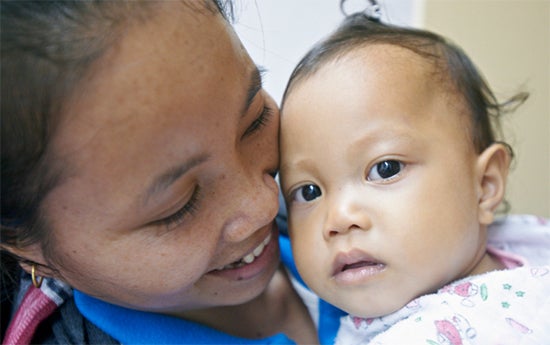
This blog first appeared in the New York Times on June 20, 2016.
Nutrition is not only fundamental to an individual’s cognitive and physical growth, it is also the cornerstone of all development efforts, whether improving education, health, income or equality, at home or abroad. And the most important time for good nutrition is in the 1,000 days from the beginning of a woman’s pregnancy to the second birthday of her child. What happens in those first days determines to a large extent the course of a child’s life – his or her ability to grow, learn, work, succeed – and, by extension, the long-term health, stability and prosperity of the society in which that child lives.
Maybe you’re wondering: Why hasn’t foreign or domestic aid had more impact on economic development and poverty reduction? One major reason is that we’ve so badly neglected nutrition in utero and infancy. Too many children are getting off to a lousy start in life.
Nutrition, which works silently and internally, has long been the neglected stepchild of international development – part agriculture, part health, but disdainfully disowned by both fields. Agriculture’s practitioners have often believed their main task to be the production of ever-increasing yields; concerns about the nutritious quality of the food have been dismissed as a nuisance that could only interfere with quantity.
And the health ministries of the world have been in a constant chase for dollars to combat the disease du jour and to vaccinate mothers and children. Spending on nutrition has barely registered as a blip in national budgets.
The leading development organizations did little to elevate nutrition’s profile. In past decades, less than 1 per cent of total international development aid had been spent on nutrition, resulting in an illogical imbalance: nutrition is essential to human development, but virtually invisible in development strategies.
The first 1,000 days has been similarly overlooked. World health and development organizations have usually fixated on age five and primary school as milestone targets for intervention. For example, getting children into school has long been a holy grail of successful development. But ensuring brain development in the first 1,000 days so children are actually capable of learning once they get to school has been largely ignored.
The result of this disregard of nutrition for pregnant mothers and their young children is that one in four children under five years of age in the world is stunted, physically, cognitively, or both. As I discovered while following families in India, Uganda, Guatemala and Chicago for my new book, The First 1,000 Days: A Crucial Time for Mothers and Children – And the World, stunting is a life sentence of underachievement. The costs – less education, lower productivity and income, higher health care expenses – ripple across society, from individual to family to community to nation to the entire world. The new Global Nutrition Report estimates that sub-Saharan Africa and South Asia each lose an estimated 11 percent of gross national product annually due to malnutrition and stunting.
A 2006 World Bank report, Repositioning Nutrition as Central to Development, urgently implored: “The unequivocal choice now is between continuing to fail, as the global community did with HIV/AIDS for more than a decade, or to finally make nutrition central to development so that a wide range of economic and social improvements that depend on nutrition can be realized.”
In the decade since, nutrition has gradually moved closer to center stage. The Obama administration launched its Feed the Future initiative, aiming to reduce hunger, malnutrition and stunting through agricultural development, especially in Africa. A broad group of nations and foundations pledged to increase investments at a series of Nutrition for Growth summits. At the recent World Bank spring meetings in Washington DC, finance ministers and bankers acknowledged that investing in “gray matter infrastructure” – the brains of young children – is as important for national and global economic growth as is investing in roads, ports and buildings.
Ending hunger and malnutrition has always been seen as the moral thing to do. Now we know it is also the smart thing to do.
I invite you to join me and Keith Hansen, World Bank Group Vice President for Human Development, LIVE at 12:15 PM ET on Thursday, July 14 to discuss why it’s imperative that we invest in the early years.
Related:
World Bank Live: The First 1,000 Days: A Crucial Time for Mothers and Children - and the World


Join the Conversation